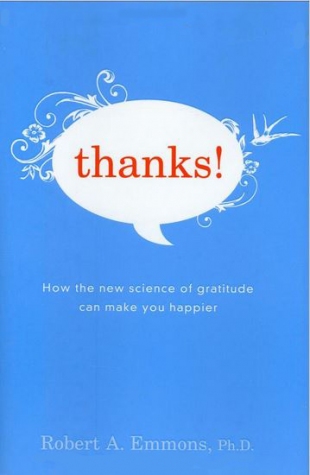Robert Emmons is a professor at the University of California, Davis, and is editor in chief of The Journal of Positive Psychology. This book is the first major scientific study of gratitude, its causes and its potential impact on human health and well-being. The John Templeton Foundation provided grants from September 1999 through December 2006 for research findings on this virtue that ranks high in the writings of theologians, philosophers, novelists, and commentators from all the world's religions. Here are some of the discoveries:
"Our groundbreaking research has shown that grateful people experience higher levels of positive emotions such as joy, enthusiasm, love, happiness, and optimism, and that the practice of gratitude as a discipline protects a person from the destructive impulses of envy, resentment, greed, and bitterness. We have discovered that a person who experiences gratitude is able to cope more effectively with everyday stress, may show increased resilience in the face of trauma-induced stress and may recover more quickly from illness and benefit from greater physical health. Our research has led us to conclude that experiencing gratitude leads to increased feelings of connectedness, improved relationships, and even altruism. We have also found that when people experience gratitude, they feel more loving, more forgiving, and closer to God."
These benefits of gratitude should be enough to convince even the most cynical secularist that this emotion is essential for achieving happiness and contentment. But Emmons has even more material for us to savor. For example, he writes about the positive values of keeping a gratitude journal, the ability of grateful individuals to make the most of the restorative act of sleep, the fact that consumerism fosters ingratitude, the significance of acknowledging our dependence on others, the role of gratitude in lessening depression, and the effective use of gratitude as a firewall against envy, greed, resentment, and anger.
A very illuminating section covers factors that undermine this virtue, including forgetfulness, comparison thinking, the negativity bias, perceptions of victimhood, and emotional conflicts. Emmons is inspired by those individuals who in the midst of suffering have been able to be grateful for little things and hence to transform adversity into learning.
Here are some quotations about gratitude from the book:
• "I cannot tell you anything that, in a few minutes, will tell you how to be rich. But I can tell you how to feel rich, which is far better, let me tell you firsthand, than being rich. Be grateful . . . It's the only totally reliable get-rich-quick scheme." — Ben Stein
• "I would maintain that thanks are the highest form of thought, and that gratitude is happiness doubled by wonder." — G. K. Chesterton
• "Grace and gratitude go together like heaven and earth." — Karl Barth
• "Gratitude as a discipline involves a conscious choice. I can choose to be grateful even when my emotions and feelings are steep and hurt and resentful. It is amazing how many occasions present themselves in which I can choose gratitude instead of a complaint. I can choose to be grateful when I am criticized, even when my heart responds in bitterness. . . . I can choose to listen to the voices that forgive and to look at the faces that smile, even while I still hear words of revenge and see grimaces of hatred." — Henri Nouwen
Emmons injects a personal note near the end of the book when he admits:
"I find the sustained practice of gratitude difficult. It does not always come easily or naturally to me, and I effortfully have to redirect ingrained tendencies to take life for granted. That may be the only thing I have in common with [Albert] Einstein. He had to remind himself, a thousand times a day by his count, of how much he depended on other people. A thousand times a day, I too have to remind myself to be grateful and to remember how much I depend upon other people."
It is easy to talk about the value of gratitude but much more difficult to walk the talk. The author concludes with 10 Prescriptions for Becoming More Grateful, including keeping a gratitude journal, coming to your senses, using visual reminders, making a vow to practice gratitude, and thinking outside the box.
